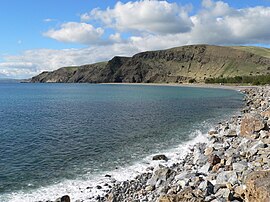Rapid Bay
|
Rapid Bay South Australia |
|||||||||||||
|---|---|---|---|---|---|---|---|---|---|---|---|---|---|

Rapid Bay shoreline looking towards Second Valley.
|
|||||||||||||
| Coordinates | 35°31′28″S 138°11′14″E / 35.52444°S 138.18722°ECoordinates: 35°31′28″S 138°11′14″E / 35.52444°S 138.18722°E | ||||||||||||
| Postcode(s) | 5204 | ||||||||||||
| Time zone | ACST (UTC+9:30) | ||||||||||||
| • Summer (DST) | ACDT (UTC+10:30) | ||||||||||||
| Location | 100 km (62 mi) S of Adelaide | ||||||||||||
| LGA(s) | District Council of Yankalilla | ||||||||||||
| State electorate(s) | Finniss | ||||||||||||
| Federal Division(s) | Mayo | ||||||||||||
|
|||||||||||||
| Footnotes | Adjoining localities | ||||||||||||
Rapid Bay is the name of both a locality (postcode 5204) including a small seaside town and a small bay on the west coast of the Fleurieu Peninsula, South Australia. It lies within the District Council of Yankalilla and its township is approximately 100 km south of the state capital, Adelaide. It is well known for its limestone quarry and its pair of jetties which are popular sites for recreational fishing, scuba diving and snorkelling.
Rapid Bay features in the creation myths of both the Kaurna and Ramindjeri people, most notably as the burial site of creation ancestor Tjilbruke's nephew.
South Australia Colonial Surveyor General Colonel William Light made his first landfall on mainland South Australia at Rapid Bay on 8 September 1836. The site was named after Light's ship, the 162 ton brig Rapid. To mark this historic landfall the Colonel's initials, "W.L.", were carved into a large boulder – a replica is visible in the township, while the original is stored in the South Australian Museum, in Adelaide. John Rapid Hoare, the first European child born on mainland South Australia, was delivered at Rapid Bay on 7 November 1836.
For a short time Rapid Bay was considered a potential site for the new state capital, but with the discovery of the Adelaide Plains it faded into quiet obscurity.
The Broken Hill Proprietary (BHP) constructed the town, an ore-loading jetty and a high voltage power line from Willunga during the period 1938 to 1942 as part of the works undertaken to establish the limestone quarry. Mining commenced in 1942. The limestone was used as a flux in the company's steelworks at Whyalla in South Australia, and Newcastle and Port Kembla in New South Wales.
...
Wikipedia

